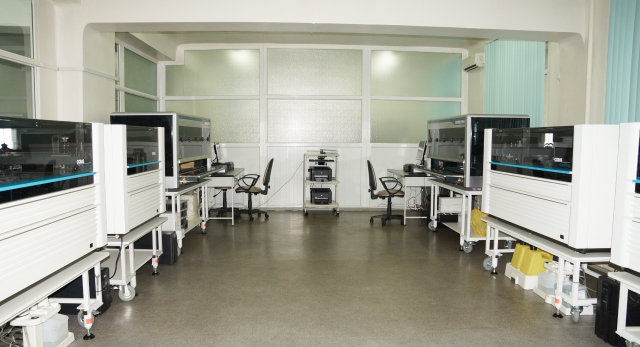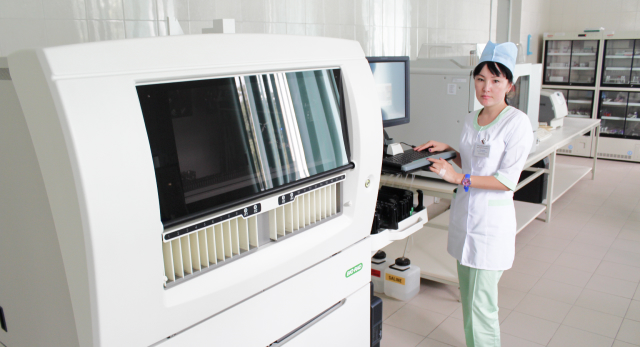- Home
- Our center
- Structure of the Blood Center
- Structural divisions
Blood Testing Laboratory

Chernyaeva Elena Vladimirovna
Head of the Blood Testing Laboratory
Laboratory assistant of the highest qualification category, in the blood service of the Republic of Kazakhstan - 10 years
Has a higher medical education. In 1994 she graduated from the Karaganda State Medical Institute, Faculty of Preventive Medicine.
From 1995 to 2004 she worked as the head of the clinical and diagnostic laboratory of the City Infectious Diseases Hospital in Temirtau. From 2011 to 2014, she held the position of a laboratory assistant at the immunohematological laboratory of the Almaty City Blood Center. From 2014 to the present, she has been the head of the blood testing laboratory of the Republican Blood Center. Has a Specialist Certificate.
Completed advanced training courses:
- NPCT Astana: "Enzyme immunoassay and molecular biological diagnostic methods in the screening of donor blood”.
- HSE: "Organization of measures to prevent blood transfusion infections in the Republic of Kazakhstan in the context of the new public health”.
- KAZNMU: "Methods of enzyme immunoassay in the clinical diagnostic laboratory”.
- She was awarded the diploma of the Minister of Health of the Republic of Kazakhstan for fruitful work in the field of healthcare.
The main tasks of LTK are:
- ensuring infectious and immunohematological safety of donor blood, its components and preparations.
- Conducting studies for antigen / antibodies to HIV 1, 2, antigen / antibodies to hepatitis C virus, HBsAg of hepatitis B virus, and total antibodies to Treponema pallidum (syphilis) by methods, ELISA, IHLA and PCR, and also complementary methods are used diagnostics, in accordance with regulatory documents and testing algorithms individually for each infection.
- testing of blood samples from donors, recipients, patients, pregnant women for blood groups according to the ABO system and Rh-affiliation in order to ensure the immunohematological safety of blood transfusion and the quality of blood and its components;
- Performing the full volume and proper quality control of laboratory tests to ensure the safety of blood transfusions.
- screening of anti-erythrocyte alloantibodies in the blood serum of donors, recipients, pregnant women;
- providing methodological assistance to the structural units of the RCC on laboratory examination of donors and medical organizations to ensure the immunohematological safety of blood transfusion therapy.
Main functions of LTK:
- Initial laboratory donation;
- Determination of blood group by ABO system by direct method;
- Determination of the presence of Kell antigen in the reaction of direct agglutination on a flat surface;
- Determination of hemoglobin from capillary blood;
- Determination of serum alanine aminotransferase activity;
- Determination of total protein in serum;
- Complete blood count (research on a hematological analyzer);
- Determination of the erythrocyte sedimentation rate;
- Determination of protein fractions in blood serum;
- Counting platelets in a smear;
- Screening of anti-erythrocyte alloantibodies for clinically significant systems in the indirect Coombs' test;
- Determination of antibody titer in the indirect Coombs test;
- Identification of anti-erythrocyte alloantibodies;
- Direct Coombs test;
- Diagnosis of hemolytic disease of the newborn;
- Screening of immune antibodies by ABO system;
- Determination of the blood group by the ABO system by the cross method;
- Typing of erythrocytes by antigens of the Rhesus and Kell system;
- Determination of a wide range of RH1 (D) and D-weak (RhW1) antigens, including the DVI antigen category;
- Testing for compatibility in the indirect Coombs' test;
- Typing erythrocytes for rare antigens;
- Production of canned standard erythrocytes and their use in isoserological studies;
- Conducting serological tests for markers of HIV1,2, hepatitis B and C viruses, the causative agent of syphilis by enzyme-linked immunosorbent assay (ELISA) and immunochemiluminescent (IHLA) methods of blood serum analysis on automatic closed-type analyzers using a two-stage method;
- Conducting confirmatory studies for HIV 1,2, HBV, HCV, syphilis;
- Testing blood products for markers to HIV 1, 2 and hepatitis B, C, The list of drugs and requirements for ensuring their infectious safety may change as new drugs are introduced into production and changes in the requirements of regulatory documents of the Pharmacopoeia Committee;
- Conducting daily internal quality control (hereinafter VLK) studies using laboratory standards, participation in the external quality assessment (hereinafter EQA) of the laboratory activities carried out by the reference laboratory of the NPCT in Astana on immunohematological, biochemical and infectious control panels;
- Archiving the residual blood serum volume of all donors in a separate freezer, subject to the conditions of authorized access, separate storage of positive and negative samples for 3 years at a temperature of -40 ° C;
- Compliance with the confidentiality of data on the results of laboratory testing of blood samples in accordance with the legislation of the Republic of Kazakhstan;
- Keeping records of work in accordance with the approved forms of the Order of the Ministry of Health of the Republic of Kazakhstan No. 907 dated 23.11.2010;
- Submission of monthly reports to reporting organizations (City AIDS Center, Skin and Venereal Diseases Dispensary (KVD) in accordance with the requirements of the current regulatory legal acts;
- Passing repeated safety instructions 2 times a year with data entry in the safety log, as well as other types of instructions in accordance with safety requirements;
- LTK carries out its activities in cooperation with other structural divisions of the enterprise, as well as within its competence with third-party organizations;





